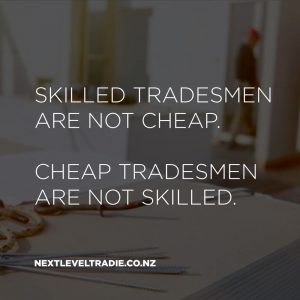

5 KEYS FOR WINNING JOBS WHEN YOU’RE NOT THE LOWEST PRICE
LOST OUT TO A COWBOY AGAIN!
Local builder Josh is fuming. He’s just learned (through the grapevine) that he’s missed out on the King Street reno. The local cowboy has undercut him again! By nearly 1/3 this time.
Bugger! He wanted that one. It would have kept his team going for a few more weeks until the next big project started. That’s gonna put some real pressure on the bank account.
But there’s no way he could have made any money at a rate that low. At that price, it would’ve only covered the materials and labour.
He’d had an inkling when scoping the job that Mike (the client) might be shopping around. The job looked relatively straight forward initially, but from experience, Josh knew there were a few extras that would be needed.
Josh didn’t have time to explain all this to the client that day; he needed to be at the next appointment. “Mike, don’t worry about the details mate. I’ll put it all in the quote and email it to you when I’ve got time”.
NOW THAT JOB HE THOUGHT WAS IN THE BAG IS GONE
These cowboys are starting to affect business. There was another job a while back where the same thing happened. That job had come back to him when it turned to custard. Josh won’t forget that one for a while.
Homeowner Jess came to him in a panic: “We need to finish the extensions. We’re having a new baby next month! There are a few things that don’t look quite right, but every time I ask about them, [rogue tradie] says it’s fine that bit won’t matter when it’s finished, and the project is going on and on… And then he asks for more money! I don’t think he knows what he’s doing… can you please come and take a look?”…
What a mess. Josh and his team all did massive hours that month, but they got the job done. It took as long to fix as it would have taken to do the whole thing right the first time. Todd & Jess were so grateful. But Josh felt it put too much pressure on his guys. Didn’t see much of the family that month either.
These cowboys, they do it on the cheap and stuff it up every time.
WHAT WENT WRONG
When Josh first scoped Mike’s job, there were a few opportunities he missed that would have put him in a better position against the lower price:
- Asking the right questions early on to see if the job will be a good fit (so he didn’t waste time quoting a job he couldn’t make money off – or was never going to get).
Josh still doesn’t really know if Mike wanted a cheap price no matter what, or if he took the cheap price because he didn’t know any better. - Checking if Mike was the decision maker or if there were others involved in deciding, like maybe his wife.
- Didn’t take the time to listen to what aspects of the job were the most important to Mike (like perhaps time frame, quality of work, dealing with the unexpected, staying on budget, etc)
- Making sure Mike understood what was involved in doing the job right, and giving him some context around what could go wrong if whoever is doing the job doesn’t follow the proper steps.
- Identifying what budget Mike had available for the job.
- Making a detailed estimate/quote and making sure Mike understood each part (and knew what he was getting when dealing with a quality tradie like Josh). So that if Mike compared the quote to another one, the difference would be obvious.
- No follow up to show he was serious about wanting the job and/or address any concerns Mike might have about proceeding.
WHAT WENT RIGHT
Josh is a good builder and has a great team behind him. So although he didn’t get the job, he also knew that at 2/3 of the original price, it wasn’t worth having.
Josh knows his numbers, has a good reputation and is in business for the long haul so he:
- Priced the job for profit (not based on gut feel, guesswork, or how he was feeling on the day) and knew that it wasn’t too high or too low.
- Knew his margins and at exactly what point the job wasn’t worth doing.
- Didn’t panic and slash his price and lose money on the job.
- Has high standards of workmanship and was not going to take cowboy shortcuts.
- Has a professional mindset. Josh knows he delivers top outcomes and quality work for his clients and that he deserves a fair reward for his efforts.

CLIENTS VIEWPOINT
We all like a bargain. It’s human nature. So clients will always be tempted to go for the cheapest option if they don’t understand the reasons not to.
Here’s the thing though. Most clients you quote aren’t tradies or don’t know the details like you do. They simply don’t know why one price is more expensive than another. Unless you show them.
Remember, a certain low percentage of all buyers will decide purely on price no matter what. Let’s recognise that those jobs are often the ones that no one makes any money off, and have the most problems. Weed these ones out early. These are not the jobs you want.
You want to attract the much larger majority who appreciate good workmanship and want something that will last. Who want to sleep soundly at night, with peace of mind that the work is done right and there won’t be any nasty surprises.
To give prospective clients the reassurance they need when quoting – and play to your strengths as a quality tradie – use these:
5 KEYS FOR WINNING JOBS
# 1. Turn up on time (ie a few minutes early)
- Everyone knows tradies are notorious for being late and that customers hate it. So use this to your advantage.
- 84% of homeowners rank “punctuality” as the most influential quality when they’re looking to hire a tradesman.
- If you can crack being on time, this will show you are reliable and put you ahead of most competition right away.
- Block time out for pricing up work (ie not at a time you might be stretched to get there, or at the end of a long day when you’re hankering to get home).
- Mindset comes into play. Sometimes tradies view quoting as a hassle. However, meeting potential clients is high-value important work. An hour of your time could bring in big profit if you play your cards right.
- 83% also say “prompt communications” makes them more inclined to choose you. Have someone answering your calls and email, or at least return them without delay.
# 2. Be intentional about building rapport and trust
People do business with people they know, like and trust. Build relationships with potential clients by doing the little things well and on purpose:
- 83% would be more likely to hire a tradie with “a polite manner”. The obvious, common sense stuff: “Nice to meet you” “Yes please” “No thanks”. Knock and step back from the door. Show genuine interest and enthusiasm for the project. Respect the clients time. Use the clients name. Compliment them. Listen and repeat back bits of what they say. Understand and show empathy. Smile. Be helpful. Reframe the negative to positive.
- Respect your clients home or workplace: Take boots off at door. Ask permission: “Would you like to show me…” “Is it okay if I…” “May I…” Be aware of kids and pets. Don’t walk on the grass – use the paths.
- Look the part: Be well presented. Wear your company uniform. Have a clean spare one on hand if needed.
- 47% of clients say they’re more likely to hire a tradie with “a modern, clean, professional-looking van”. 36% say “an anonymous plain white van is a turn-off”. Not a game changer but worth noting.
# 3. Take the time to fully understand your prospects motives
- Your goal here is to understand exactly what the client wants to achieve – and the “why” behind it.
- Start with listening. 85% of clients say simply “listening to what I want and need” is a sign of a good tradesman and would make them more likely to say yes. This helps them feel comfortable you understand what they’re looking for – and that you’re committed to a great outcome for them.
- It’s also going to be easier to win the job when you know exactly what the ideal outcome is for the client, and what’s most important to them. With this knowledge, you can emphasise the right details in the quote, talk the client through all parts most important to them, and easily tackle any objections they might have.
- Ask questions to find out what their biggest priority and concerns are for the project. Is it quality, price/sticking to the budget, timeframe or a deadline they have, just wanting a hassle-free experience above all?
- Once you have a good handle on what the client wants, parrot it back to them and ask if what you’ve heard is correct.
# 4. Take the time to educate and explain
- Tell them what goes into a job and what it includes, so if they are comparing, it’s apples to apples, not apples with bananas.
- Educate the client around what they want to accomplish. Give your expert advice on the different options so they can feel informed when deciding. Take an iPad along and show them photos of your previous jobs (or look up pictures on Google) so they can get an idea of the finished look.
- 81% look for a tradesman that “discusses their process and explains things” – so take the time to outline how you’ll go about the job. Draw diagrams. Explain any complications that could arise. Give the client more than your competitors do.
- Be transparent about likely prices and timeframes.
- Tell them when they’ll have the quote.
- Don’t look at it as selling… Have the attitude of genuinely helping the client get the best solution for their project. Become the problem-solver for your client, and you become invaluable.
# 5. Show proof you’re the best
- 78% of clients want to see a “professional quote”. Include many details like a breakdown of what’s included, how variations will be handled, price, timeline (69% felt it was important to see “a solid schedule”), outline your process, expiry date of quote, payment terms and conditions, where they sign, etc
- Include trust builders like a professional blurb saying what sets your company apart, your quality guarantee (46% of clients look for this), media/awards, your trades association membership, qualifications, license etc
- Personalise your quote, emphasising your clients needs and priorities. Go above and beyond.
- Include testimonials from happy customers with before and after photos and examples of your previous work.
Houzz Aussie looked at what influences hiring decisions in home renos and found 79% look for reviews and recommendations (twice as important than “lowest cost” at 29%).
Branz found “quality and reputation” is the most important feature NZ homeowners look for when choosing a builder – by far.
Back this up online with a professional website, lots of positive reviews and social proof, an up to date Facebook page, etc - Losing jobs because you quoted too late? 83% of clients are unhappy about the speed of receiving quotes. No surprises there. Deliver the quote to the client promptly. Using job management software can help.
- Go through your quote with the client, making sure they understand what’s included and answering any queries clarifying exactly what you’re giving them. If they’re undecided, agree on a timeframe when you’ll follow up again. Ask: “What’s the next step for you?”
It takes time and effort to put a quote together, so go the extra to convert.
These things will position you so that price is not the main thing. Now you are competing on your strengths.
When the tradies I work with get these steps right, not only do they win more jobs, but they also find clients are more appreciative of their professional expertise and are happy to pay for it.
Doing it this way won’t get you every job, but it will get you a lot more work you want at the right price.
In the clients mind, you go from being just another tradie or salesperson looking for a job – to a trusted advisor – an expert whose time and expertise is respected – and worth more – than Joe Average.
KEY TAKEAWAY
To win quotes when you’re not the lowest price:
- Prioritise punctuality
- Build rapport and trust
- Listen carefully to uncover your prospects motives
- Educate and explain your process
- Show proof you’re the best choice
Some of these ideas will be new, while others you may have done before. But to get the results it’s about consistency. To pull this off, you need good systems that ensure these strategies happen every time, even when you’re busy.
Want more? To avoid more common mistakes that cost you jobs, lose you money, and rob you of your free time, grab my free ebook for actionable tips here
GET MY FREE GUIDE: "The 11 Biggest Tradie Business Mistakes & How To Fix Them"
Avoid the common pitfalls that cost you jobs, drain your hard earned cash, and rob you of time with your family.














